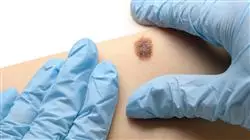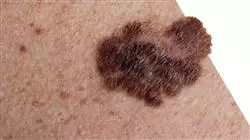University certificate
The world's largest faculty of medicine”
Introduction to the Program
You will upgrade your knowledge in Non Melanoma Skin Cancer with this Postgraduate diploma offered only by TECH"

Currently, there has been a significant increase in the incidence of squamous cell carcinoma globally, positioning it as the second most frequent type of skin cancer, after basal cell carcinoma. For this reason, physicians must be up to date in the improvement of diagnostic techniques, such as dermoscopy and biopsy, which allow early identification and confirmation of the presence of suspicious lesions. Also, professionals should be aware of therapeutic options such as surgery, radiotherapy, photodynamic therapy and other targeted therapies.
This is why TECH has created this program, which will allow specialists to enjoy an excellent overview on Non Melanoma Skin Cancer. During 6 months of intensive education, they will learn in depth about the clinical variants of Basal Cell Carcinoma, Merkel Cell Carcinoma analysis and prognostic factors of high risk cutaneous squamous cell carcinoma. They will also be able to expand their knowledge in the diagnosis of other cutaneous neoplasms, the treatment of Oral Cavity Squamous Cell Carcinoma and the Evaluation of Kaposi's Sarcoma.
A 100% online Postgraduate diploma, which offer professionals the versatility required to balance their day-to-day commitments with the catch-up process. In addition, the program incorporates the Relearning method, which allows physicians to delve deeper into the essential concepts of this course of study, avoiding the need to dedicate long hours to memorization. All this, accessible from any device with an internet connection and with the option of accessing it 24 hours a day, 7 days a week.
You will be up to date with the latest techniques such as dermoscopy and optical coherence tomography for the accurate diagnosis of Basal Cell Carcinoma and its variants"
This Postgraduate diploma in Non Melanoma Skin Cancer contains the most complete and up-to-date scientific program on the market. The most important features include:
- The development of case studies presented by experts in Dermatology, Oncology and Plastic and Reconstructive Surgery
- The graphic, schematic and eminently practical contents with which it is conceived gather scientific and practical information on those disciplines that are indispensable for professional practice
- Practical exercises where self-assessment can be used to improve learning
- Its special emphasis on innovative methodologies
- Theoretical lessons, questions to the expert, debate forums on controversial topics, and individual reflection assignments
- Content that is accessible from any fixed or portable device with an Internet connection
You will deepen in the most advanced surgical techniques such as Mohs surgery and reconstruction through the use of grafts and flaps"
The program’s teaching staff includes professionals from the field who contribute their work experience to this educational program, as well as renowned specialists from leading societies and prestigious universities.
The multimedia content, developed with the latest educational technology, will provide the professional with situated and contextual learning, i.e., a simulated environment that will provide immersive education programmed to learn in real situations.
This program is designed around Problem-Based Learning, whereby the professional must try to solve the different professional practice situations that arise during the course. For this purpose, students will be assisted by an innovative interactive video system created by renowned and experienced experts.
You will implement in your medical practice the most recent advances based on scientific evidence to perform Skin Graft or Local Flap"

With TECH you will update your knowledge in the rapid diagnosis of Cutaneous Squamous Cell Carcinoma by evaluating factors such as size, depth and perineural invasion"
Why study at TECH?
TECH is the world’s largest online university. With an impressive catalog of more than 14,000 university programs available in 11 languages, it is positioned as a leader in employability, with a 99% job placement rate. In addition, it relies on an enormous faculty of more than 6,000 professors of the highest international renown.

Study at the world's largest online university and guarantee your professional success. The future starts at TECH”
The world’s best online university according to FORBES
The prestigious Forbes magazine, specialized in business and finance, has highlighted TECH as “the world's best online university” This is what they have recently stated in an article in their digital edition in which they echo the success story of this institution, “thanks to the academic offer it provides, the selection of its teaching staff, and an innovative learning method aimed at educating the professionals of the future”
A revolutionary study method, a cutting-edge faculty and a practical focus: the key to TECH's success.
The most complete study plans on the university scene
TECH offers the most complete study plans on the university scene, with syllabuses that cover fundamental concepts and, at the same time, the main scientific advances in their specific scientific areas. In addition, these programs are continuously being updated to guarantee students the academic vanguard and the most in-demand professional skills. In this way, the university's qualifications provide its graduates with a significant advantage to propel their careers to success.
TECH offers the most comprehensive and intensive study plans on the current university scene.
A world-class teaching staff
TECH's teaching staff is made up of more than 6,000 professors with the highest international recognition. Professors, researchers and top executives of multinational companies, including Isaiah Covington, performance coach of the Boston Celtics; Magda Romanska, principal investigator at Harvard MetaLAB; Ignacio Wistumba, chairman of the department of translational molecular pathology at MD Anderson Cancer Center; and D.W. Pine, creative director of TIME magazine, among others.
Internationally renowned experts, specialized in different branches of Health, Technology, Communication and Business, form part of the TECH faculty.
A unique learning method
TECH is the first university to use Relearning in all its programs. It is the best online learning methodology, accredited with international teaching quality certifications, provided by prestigious educational agencies. In addition, this disruptive educational model is complemented with the “Case Method”, thereby setting up a unique online teaching strategy. Innovative teaching resources are also implemented, including detailed videos, infographics and interactive summaries.
TECH combines Relearning and the Case Method in all its university programs to guarantee excellent theoretical and practical learning, studying whenever and wherever you want.
The world's largest online university
TECH is the world’s largest online university. We are the largest educational institution, with the best and widest online educational catalog, one hundred percent online and covering the vast majority of areas of knowledge. We offer a large selection of our own degrees and accredited online undergraduate and postgraduate degrees. In total, more than 14,000 university degrees, in eleven different languages, make us the largest educational largest in the world.
TECH has the world's most extensive catalog of academic and official programs, available in more than 11 languages.
Google Premier Partner
The American technology giant has awarded TECH the Google Google Premier Partner badge. This award, which is only available to 3% of the world's companies, highlights the efficient, flexible and tailored experience that this university provides to students. The recognition as a Google Premier Partner not only accredits the maximum rigor, performance and investment in TECH's digital infrastructures, but also places this university as one of the world's leading technology companies.
Google has positioned TECH in the top 3% of the world's most important technology companies by awarding it its Google Premier Partner badge.
The official online university of the NBA
TECH is the official online university of the NBA. Thanks to our agreement with the biggest league in basketball, we offer our students exclusive university programs, as well as a wide variety of educational resources focused on the business of the league and other areas of the sports industry. Each program is made up of a uniquely designed syllabus and features exceptional guest hosts: professionals with a distinguished sports background who will offer their expertise on the most relevant topics.
TECH has been selected by the NBA, the world's top basketball league, as its official online university.
The top-rated university by its students
Students have positioned TECH as the world's top-rated university on the main review websites, with a highest rating of 4.9 out of 5, obtained from more than 1,000 reviews. These results consolidate TECH as the benchmark university institution at an international level, reflecting the excellence and positive impact of its educational model.” reflecting the excellence and positive impact of its educational model.”
TECH is the world’s top-rated university by its students.
Leaders in employability
TECH has managed to become the leading university in employability. 99% of its students obtain jobs in the academic field they have studied, within one year of completing any of the university's programs. A similar number achieve immediate career enhancement. All this thanks to a study methodology that bases its effectiveness on the acquisition of practical skills, which are absolutely necessary for professional development.
99% of TECH graduates find a job within a year of completing their studies.
Postgraduate Diploma in Non Melanoma Skin Cancer
Are you ready to live the TECH experience by studying from home? TECH is proud to present the Postgraduate Diploma in Non Melanoma Skin Cancer. Non Melanoma Skin Cancer is a disease that affects a large number of people worldwide. It is a type of cancer that develops in the skin and does not affect melanocytes, the cells responsible for melanin production. Although it is not usually as aggressive as melanoma, it is essential to have experts in the field for its study and treatment. That is why the academic program Postgraduate Diploma in Non Melanoma Skin Cancer is presented as an ideal option for those health professionals who wish to specialize in this area.
Study with a practical approach at TECH
Another remarkable aspect of this program is its practical nature. Participants will have the opportunity to apply the knowledge acquired in real cases, which will allow them to develop key skills and abilities in the management of this disease. In addition, they will be supported by specialized teachers who will guide them throughout the learning process. The importance of having experts in non-melanoma skin cancer is indisputable. This disease can have serious consequences for people's health and its early detection is essential to ensure effective treatment. With the Postgraduate Diploma in Non Melanoma Skin Cancer academic program, participants will be able to acquire the knowledge and skills necessary to become highly specialized professionals in this area. In summary, the Non Melanoma Skin Cancer Postgraduate Diploma academic program is presented as a unique opportunity for those health professionals who wish to specialize in this area. With comprehensive and practical specialization, participants will be able to acquire the necessary knowledge to provide quality care to patients suffering from this disease. Do not miss the opportunity to prepare yourself in an exciting discipline and join this academic program.







